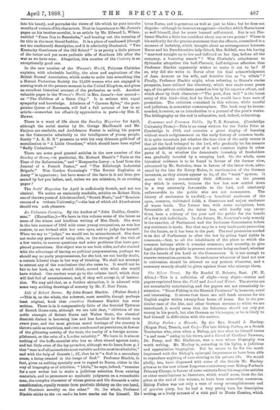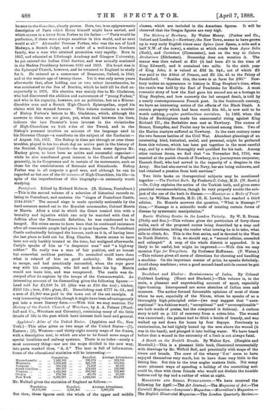Bishop Forbes : a Memoir. By the Rev. Donald J.
Mackey. (Kegan Paul, Trench, and Co.)—The late Bishop Forbes, as a Scotch Tractarian who, even when a Bishop, got into what he himself terms "a sad mesa" owing to his views, and a frieud of Cardinal Newman, Dr. Piney, and Mr. Gladstone, was a man whose biography was worth writing. Mr. Mackey is, according to his lights, a judicious and appreciative biographer. But be seems to be far too much impressed with the Bishop's episcopal importance to have been able to reproduce anything of note relating to his private life. We would gladly, too, have dispensed with some of the details Mr. Mackey gives as to the now almost forgotten controversy over Bishop Forbes's Primary Charge, in favour of some extracts from his magazine articles or other contributions to literature, which would seem, from the list given at the end of this volume, to have been somewhat numerous. Bishop Forbes was not only a man of many accomplishments and of genuine piety, but he had a very pretty turn for descriptive writing, as a lively account of a visit paid to Monte Cassino, which he sent to the Guardian, clearly proves. Here, too, is an epigrammatic description of Paris which Heine himself might have envied, and which occurs in a letter from Forbes to his father :—" Paris would be perfection, if there were always sunshine in this world, and no next world at all." Alexander Penrose Forbes, who was the son of Lord Medwyn, a Scotch Judge, and a cadet of a well-known Northern family, was a man who attained promotion very rapidly. Born in 1817, and educated at Edinburgh Academy and Glasgow University, he yet entered the Indian Civil Service, and was actually stationed in the Madras Presidency between 1836 and 1839. His heart was in the Episcopal Church, however, and he returned to England to study for it. He entered as a commoner of Brasenose, Oxford, in 1840, and at the mature age of twenty-three. Yet it was only seven years afterwards that, after holding one or two minor incumbencies, he was nominated to the See of Brechin, which he held till he died un- expectedly in 1875. His election was mainly due to Mr. Gladstone, who had discovered the abilities and earnestness of "young Forbes," and who in his capacity, however, not as politician, but as a Kincar- dineshire man and a Scotch High-Church Episcopalian, urged his claims with his wonted fervour. This volume contains a number of Bishop Forbes's letters to Mr. Gladstone, which, although the answers to them are not given, yet, when read between the lines, indicate the late Premier's keen interest in the vicissitudes of High-Churchism on bath sides of the Tweed, and in the Bishop's personal troubles on account of the language used in his Diocesan Charge—a manifesto on the subject of the Eucharist— of August 5th, 1857. The Bishop in time got through or over these troubles, played in his too short day an active part in the history of the Scottish Episcopal Church—he seems, from some figures Mr. Mackey gives, to have been an active and successful organiser— while he also manifested great interest in the Church of England generally, in its Congresses and in certain of its movements, such as those for the establishment of Retreats and Sisterhoods. Bishop Forbes was in all respects a good man, and although he can be regarded as but one of the dii minores of High-Churchism, his life—in spite of the imperfections of this biography—is eminently worth studying.



































 Previous page
Previous page